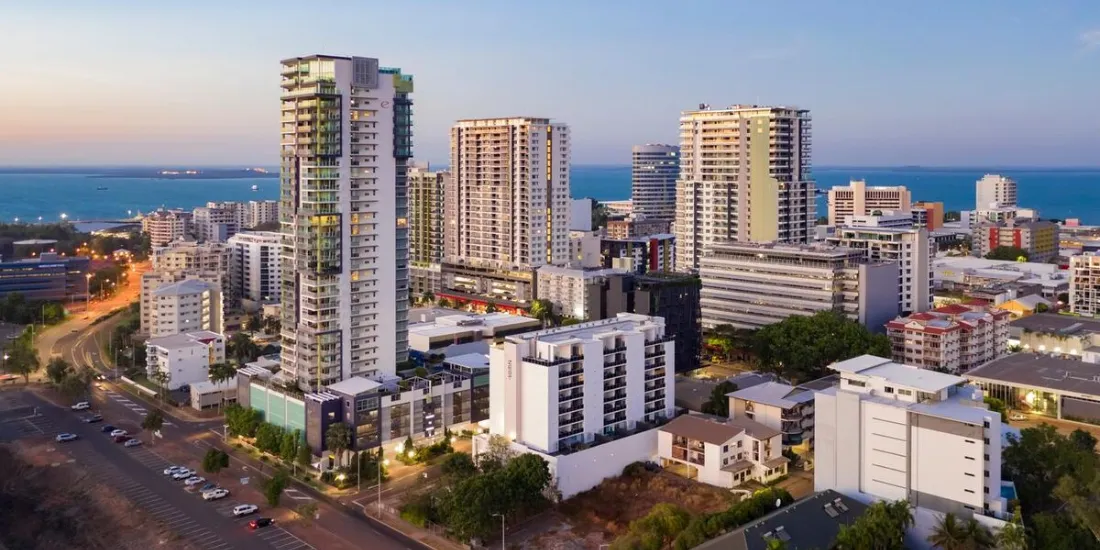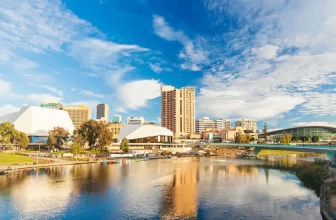
The first thing that hits you when you step out of Darwin International Airport isn’t the heat (though that hits hard and fast)-it’s the smell of eucalyptus trees baked under the Northern Territory sun. There’s this dry, earthy scent mixed with sea breeze that tells you, unmistakably: you are far from home now.
I remember dragging my suitcase (the wheel broke before baggage claim because of course it did), squinting into this ridiculously bright sky, and thinking, “This place feels… untouched. Like a quiet corner of the world hiding something wild.”
Birds you’ve only seen in documentaries squawk overhead. Locals walk around in shorts and hoodies (trust me, they get cold when it’s 25ºC). Everything feels slower-but in a good way. The city isn’t crowded or chaotic like Sydney or Melbourne. It breathes.
That first cab ride, watching massive palm trees and red earth flash past the windows? It’s a memory that doesn’t fade. You realize very quickly that Darwin isn’t trying to impress you. It’s just doing its thing. And if you’re open to it, you’ll fall in love with that.
Especially if you’re coming for overseas education in Australia and using this study guide in Darwin to make your 2026 plan real.
Why Choose Darwin in 2026? A Smart Study Guide in Darwin Perspective
Darwin doesn’t top the usual lists when people think of places to study in Australia. But that’s actually part of its magic.
For starters, it’s a strategic, growing education hub. Charles Darwin University (CDU) ranks among the top 100 young universities worldwide and is increasing international programs and research ties with Asia-Pacific countries-massive if you’re looking into international degree programs and future-proof career paths.
But it goes beyond academics.
Darwin sits at the gateway between Asia and Australia. You’ve got direct flights to Singapore, Bali, and Jakarta. With Australia’s Northern Territory government actively encouraging more international enrollment (they just increased post-study work rights to 4 years starting 2025-yes, really), it’s a good time to think long-term.
Real-world benefits? Let’s Break it down :
- Part-time jobs for students: Up to 48 hours per fortnight during the semester
- Post-graduation employment opportunities in emerging industries
- Regional migration points advantage (huge for PR seekers)
- A student support system more visible than in major cities
- Faster cultural adaptation because of smaller, more welcoming communities
Also, in 2026, housing costs here (compared to the likes of Sydney or Melbourne) are still tame. That’s important when calculating living expenses breakdown, especially when you’re trying to manage your finances as an international student.
Bottom line? If you’re looking for quality overseas education in Australia, employability, and a unique Aussie student lifestyle-Darwin’s got you covered.
Why Darwin Matters for International Students – A Study Guide in Darwin Must-Know
Let’s be honest. Darwin isn’t big-it’s home to around 150,000 people. But you’d be surprised by how international it feels. Nearly 30% of residents are born overseas, and Charles Darwin University alone pulls students in from more than 65 countries, making the student community and networking surprisingly diverse.
Because it’s not overflowing with students like Melbourne, there’s a stronger focus on student support services. CDU, for instance, offers:
- Free airport pickups
- Dedicated international student mentoring programs
- Mental health and wellbeing resources
- Academic calendar and semester system support
The Northern Territory government also gives out an International Student Support Grant (value: up to $1,500) to help students with early expenses. It’s not a huge amount but definitely helps when you first land.
Also, Darwin’s location means industries here-tourism, renewable energy, logistics, community healthcare-love hiring international students, especially those with language proficiency in English and other languages.
A friend of mine studying health sciences at CDU landed a job at Royal Darwin Hospital in her second semester. “Here, we’re seen as people-not just student numbers.”
Top Universities and Colleges Covered in This Study Guide in Darwin
1. Charles Darwin University (CDU)
- Ranking: Top 100 young universities (Times Higher Ed)
- Popular Programs: Engineering, Business, Nursing, Environmental Science
- Tuition for International Students: AUD
- 25,000–33,000/year
- Student Life: Relaxed, diverse, and outdoorsy
- Campus Vibe: Open green spaces, close to Casuarina Beach
If you’re after research opportunities, CDU has growing investment in sustainability, Indigenous knowledges, and remote health care.
What surprised me? Professors here actually know your name. You’re not fighting for face time. And the campus life and culture leans more toward balance than burnout.
2. RTOs (Registered Training Organizations)
Not technically unis, but great if you’re into vocational education or short-term skill-based learning.
Top options:
- Australian Careers College
- Alana Kaye College
- The Training Institute NT
Focus areas include construction, hospitality, aged care, and community work-relevant if you’re balancing study with part-time job opportunities.
- Tuition: AUD
- 5,000–10,000/course
- Admission requirements for international students: Often less stringent than degrees
These are great pathways if you’re targeting post-study work visa eligibility while spending less upfront.
Student Accommodation Options You’ll Want to Know – Study Guide in Darwin Housing Tips
Housing is where students either save big or blow their budget fast. Here’s where most international students live:
1. UniLodge Darwin (On-Campus at CDU)
- Cost: AUD
- 270–370/week
- Amenities: Wi-Fi, gym, study spaces, student events
- Pros: All-in-one living near class
- Cons: Not the cheapest option
Located just steps from lecture halls, it’s the go-to for student accommodation near Charles Darwin University.
2. Darwin Student Hub (Woolner Area)
- Price: AUD
- 220–300/week
- Perks: Furnished, free bike hire, 24/7 support
- Cons: 15-20 min daily commute to CDU
3. Shared Apartments in Night cliff or City
- Rent: AUD $180 (shared room) – $350 (private)
- Tip: Use Flatmates.com.au or Uni bulletin boards
- Caution: Always sign written agreements-verbal deals can cause big issues
4. Homestays via Australian Homestay Network
- Cost: AUD
- 250–300/week (includes meals)
- Best for: Younger students or those nervous about cultural adaptation
These aren’t as popular in Darwin as in larger cities, but still a safe, supported start.
Where Students Live in Darwin – Neighborhoods Explained in This Study Guide in Darwin
Casuarina
- Home turf for CDU students, close to malls, libraries, and the beach
- Rent:
- 180–250/week
- Vibe: Calm, close-knit
- Downsides: Sleepy at night-not for party lovers
Nightcliff / Rapid Creek
- Great for seaside runs, weekend markets, and sunset walks
- Rent:
- 200–275/week
- Good Eats: Laksa House, Jetty & the Fish
- Transport: 25 min bike to university
Darwin CBD
- Lively, walkable, tourist-heavy
- Rent:
- 220–320/week
- Pros: Close to nightlife, backpacker hostels, shopping
- Cons: Noisy, pricier than suburbs
Cost Breakdown – Monthly Living Expenses for 2026
Here’s your living expenses breakdown in 2026 (monthly, AUD):
| Expense | Budget | Mid | Comfort |
| Accommodation | $180 | $250 | $350+ |
| Groceries | $250 | $350 | $450 |
| Public Transport | $50 | $70 | $100 |
| Phone + Internet | $40 | $60 | $80 |
| Eating Out / Social | $100 | $180 | $250 |
| Books / Uni Supplies | $50 | $80 | $100 |
| Student Health Insurance | $45 | $60 | $70 |
Typical Total = $700 to $1,400/month
Be careful-student budgets often get blown by social expenses and transport. My advice? Cook at home a few times a week and use the CDU bike program (free rental).
Scholarships and Financial Aid – Study Guide in Darwin Application Tips
Wanna avoid debt? Chase these scholarship opportunities:
Charles Darwin University
- Vice-Chancellor’s International Scholarship (up to 50% off tuition)
- Start-Up Grant ($1,500 for new full-time students)
- Merit and Need-based aid available
Northern Territory Government
- StudyNT Scholarships
- 7,500–12,000)
Application Tips
- Apply 2–3 months before intake deadlines
- For your essay: focus on career prospects after studying, not just grades
- Check eligibility under both merit and financial hardship categories
How to Apply to Darwin Universities in 2026 – A Step-by-Step Study Guide in Darwin
1. Research Courses and Institutions
Start 8–10 months early. Use:
- CRICOS Course Search
- University open days
2. Prepare Required Documents
- Transcripts
- Passport ID pages
- Language proficiency requirements (IELTS, TOEFL, or PTE)
- Letters of recommendation
- Statement of Purpose
3. Submit Applications Online
Often through university portals or via authorized agents.
4. Accept Offer + Pay Deposit
Usually AUD 2,000–3,000
5. Visa Application Process
- Apply for subclass 500 visa
- Include medical exam & GTE statement
- Processing: 20–40 days
Visa and Work Rules in 2026 – Navigating the Student Visa Through This Study Guide in Darwin
Student Visa (subclass 500)
- Work Rights: 48hrs/fortnight during term, full-time during breaks
- Post-study visa: Up to 4 years in Darwin (regional bonus)
- Common rejection reasons: Incomplete documents, poor GTE statement, or funding proof issues
Stressed? Don’t be. Just double-check everything and don’t rush paperwork.
Getting Around Town – Transport Tips from This Study Guide in Darwin
Apps You Need:
- NT Bus Tracker
- Darwin Trip Planner
Common Modes:
- Public buses (cheap!)
- Bike (CDU has a cycle path)
- Carpool w/ flatmates
Cost: NT Student fare = $7/week unlimited
No metro or train-but that’s part of the laid-back, small-city experience.
Daily Life, Food, and Culture – What the Study Guide in Darwin Doesn’t Sugarcoat
A typical week here? Early classes, late-night café hangouts, weekend beach BBQs.
CDU clubs to join:
- International Students Society
- Darwin Eco Club
- StudyNT Ambassadors
Food culture = seafood, tropical fruits, Thai & Malay cuisine, plus plenty of vegan spots
Personal Faves:
- Darwin Laksa House (yes it’s real)
- Eva’s Café
- The Cyclone Café (great workspace too)
Internships and Career Opportunities You Should Know – Study Guide in Darwin Career Tips
Key Industries in Darwin:
- Healthcare
- Renewable energy
- Education
- Logistics
- Tourism
Internship Culture:
- Mostly unpaid unless via programs
- CDU Career Centre helps a lot
- Career prospects after studying look solid here due to regional demand
Short-Term Options to Consider – Study Guide in Darwin Alternatives for Flexible Study
- Summer Research Programs
- Winter exchange programs via parent university
- Short TAFE/VET courses that last 3–6 months
Typical cost: AUD 3,000–6,000
Great for: Language immersion, travel+study combo, skill-building
Your Month-by-Month 2026 Plan – Application Timeline in This Study Guide in Darwin
| Month | Action |
| Oct–Dec 2025 | Research programs, test prep for IELTS |
| Jan–Feb 2026 | Apply for scholarships |
| Mar–Apr | Submit uni applications |
| May–June | Accept offers + pay deposits |
| July | Begin visa process |
| Aug–Sept | Confirm housing, flights |
| Oct–Dec | Prep for arrival & orientation |
Public vs Private Universities – A Real Talk Study Guide in Darwin Comparison
| Feature | Public (CDU) | Private RTOs |
| Tuition Fees | Mid ($25k+) | Low (7k–7k–10k) |
| Class Sizes | Medium | Small |
| Visa Eligibility | ✓ | ✓ (depends) |
| Funding Options | Readily available | Limited |
| Prestige/Ranking | Higher | Variable |
Final Thoughts – Is Darwin the Right Fit?
Darwin isn’t your Instagram-perfect, big-city uni town. But it doesn’t pretend to be. If you’re after smaller classes, better student-faculty interaction, career links in regional Australia, and a genuine chance to settle long-term-this city might be right for you.
Quick Tips:
- Bring breathable clothes. It’s hot 80% of the time
- Don’t ignore local networking events-people are more helpful than in bigger cities
- Stick to budget meal prep
- Use CDU’s support-academic, mental health, visa help
- Use this study guide in Darwin as your roadmap, but write your own story
FAQs About Studying in Darwin
Darwin is more affordable than Sydney or Melbourne. Expect : 900–1,200/month all-in.
Yes-48hrs per fortnight during semester, full-time on breaks.
Yes, all courses use English. You’ll need IELTS or PTE for visa and admission.
Generally yes. Use apps like SafetyWalk and avoid late-night isolated areas.
Yep-Darwin offers up to 4-year post-study work visas (because it’s a designated regional area).
Yes-from CDU and the NT Government. Apply early.
Start in October 2025. Give yourself 8–10 months before your program starts.






